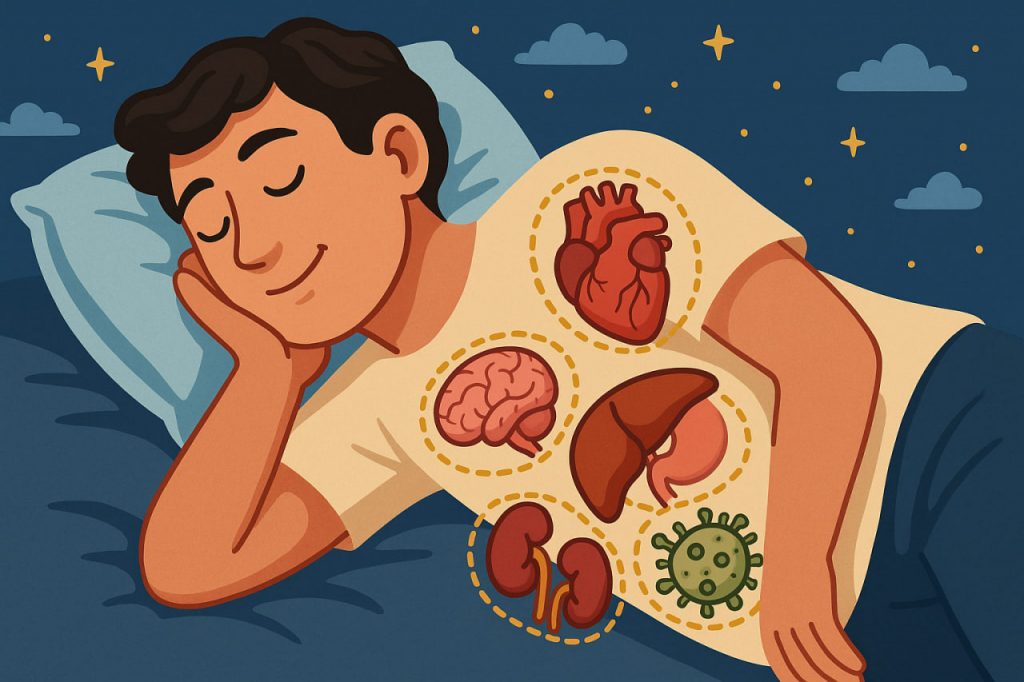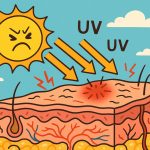Sleep is not merely a state of rest—it is a complex biological process essential for maintaining the health of internal organs and physiological systems. During sleep, the body performs critical repair, regulatory, and detoxification functions. Disruptions in sleep quantity or quality can negatively affect the brain, heart, liver, kidneys, and the endocrine and immune systems. Understanding how sleep interacts with each organ system reveals its central role in overall health.
The Brain and Nervous System
Sleep plays a vital role in neurological health. During deep stages of non-REM sleep, the brain consolidates memories, processes information, and eliminates neurotoxins through the glymphatic system—a waste clearance pathway unique to the brain. REM sleep, on the other hand, supports emotional processing and cognitive flexibility.
Chronic sleep deprivation impairs concentration, mood, and decision-making. Over time, it may contribute to neurodegenerative diseases such as Alzheimer’s. Sleep also affects neurotransmitter balance, influencing mood-regulating chemicals like serotonin and dopamine.
The Heart and Circulatory System
Cardiovascular health is closely linked to sleep. During restful sleep, heart rate and blood pressure naturally decrease, giving the cardiovascular system a chance to recover. This nightly decline helps reduce wear and tear on the heart and arteries.
However, insufficient sleep has been associated with hypertension, increased inflammation, and higher risk of heart disease and stroke. Sleep disorders like sleep apnea can cause dangerous fluctuations in oxygen levels, further straining the heart and blood vessels.
The Liver and Detoxification
The liver is a key organ for detoxification and metabolic regulation. During sleep, the liver processes toxins, synthesizes proteins, and metabolizes fats and carbohydrates. This includes regulating glucose levels and producing bile for digestion.
Disrupted sleep patterns can alter circadian rhythms, impairing liver enzyme production and hormone secretion. Chronic sleep disruption has been linked to non-alcoholic fatty liver disease (NAFLD) and disturbances in cholesterol and blood sugar levels.
The Kidneys and Fluid Balance
The kidneys regulate fluid balance, electrolyte levels, and blood pressure. Sleep supports their ability to filter blood and excrete waste products through urine. At night, the body naturally reduces urine production, a process controlled by the antidiuretic hormone (ADH).
Poor sleep affects this regulation, potentially leading to nocturia (frequent nighttime urination), salt retention, and increased blood pressure. Long-term sleep disorders can also impair kidney function and contribute to chronic kidney disease risk.
The Endocrine System and Hormonal Regulation
Sleep and the endocrine system are tightly connected. Several important hormones are released or regulated during sleep, including growth hormone, melatonin, cortisol, and insulin. Deep sleep stimulates growth hormone secretion, essential for tissue repair and development.
Lack of sleep can increase cortisol levels, leading to stress, insulin resistance, and even weight gain. It also disrupts the hypothalamic-pituitary-adrenal (HPA) axis, which controls many hormonal feedback loops. This can impact metabolism, reproductive health, and mood stability.
The Immune System and Inflammation
The immune system becomes highly active during sleep. The body produces cytokines, proteins that help fight infections and inflammation. Sleep enhances the formation of T-cells and antibodies, boosting immune memory and defense mechanisms.
Sleep deprivation weakens immune response and increases inflammation, making the body more vulnerable to infections and chronic diseases. It also impairs the effectiveness of vaccinations and slows recovery from illness or surgery.
Conclusion
Sleep is a foundational biological process that supports the optimal function of every major internal organ. From memory consolidation in the brain to detoxification in the liver and immune defense throughout the body, sleep serves as a vital time for recovery and regulation. Chronic sleep deprivation disrupts these processes and contributes to a wide range of health problems. Protecting sleep quality is essential for preserving both organ health and long-term well-being.
Glossary
- Circadian rhythm — the body’s internal 24-hour clock that regulates sleep and biological functions.
- Non-REM sleep — deep stages of sleep associated with physical restoration and memory consolidation.
- Sleep apnea — a disorder characterized by interrupted breathing during sleep.
- Glymphatic system — a brain-specific waste clearance pathway active during sleep.
- Neurotoxins — harmful substances that damage or interfere with nerve cells.
- Antidiuretic hormone (ADH) — a hormone that reduces urine production during sleep.
- HPA axis — a hormonal feedback system involving the hypothalamus, pituitary gland, and adrenal glands.
- Cytokines — signaling proteins that regulate immune responses and inflammation.


